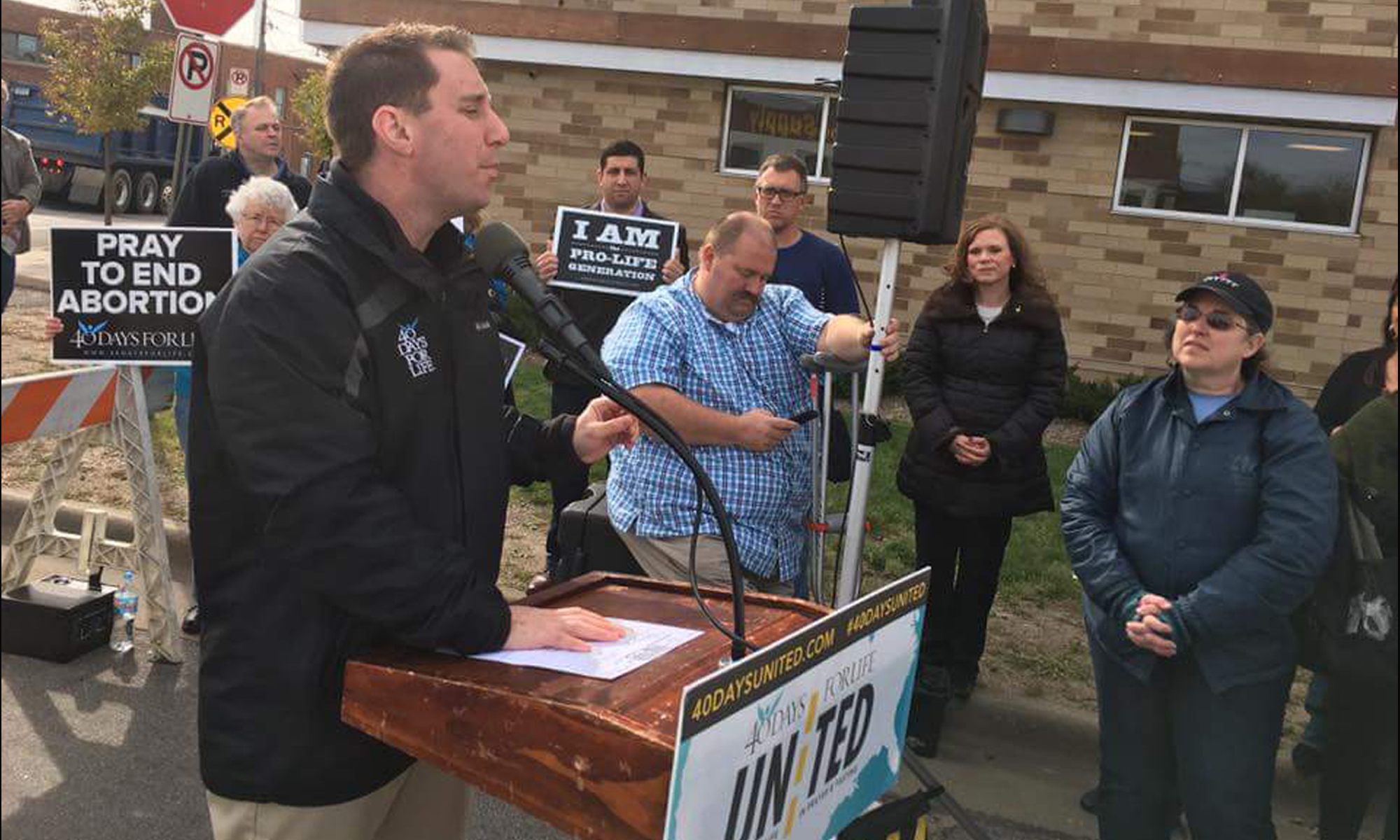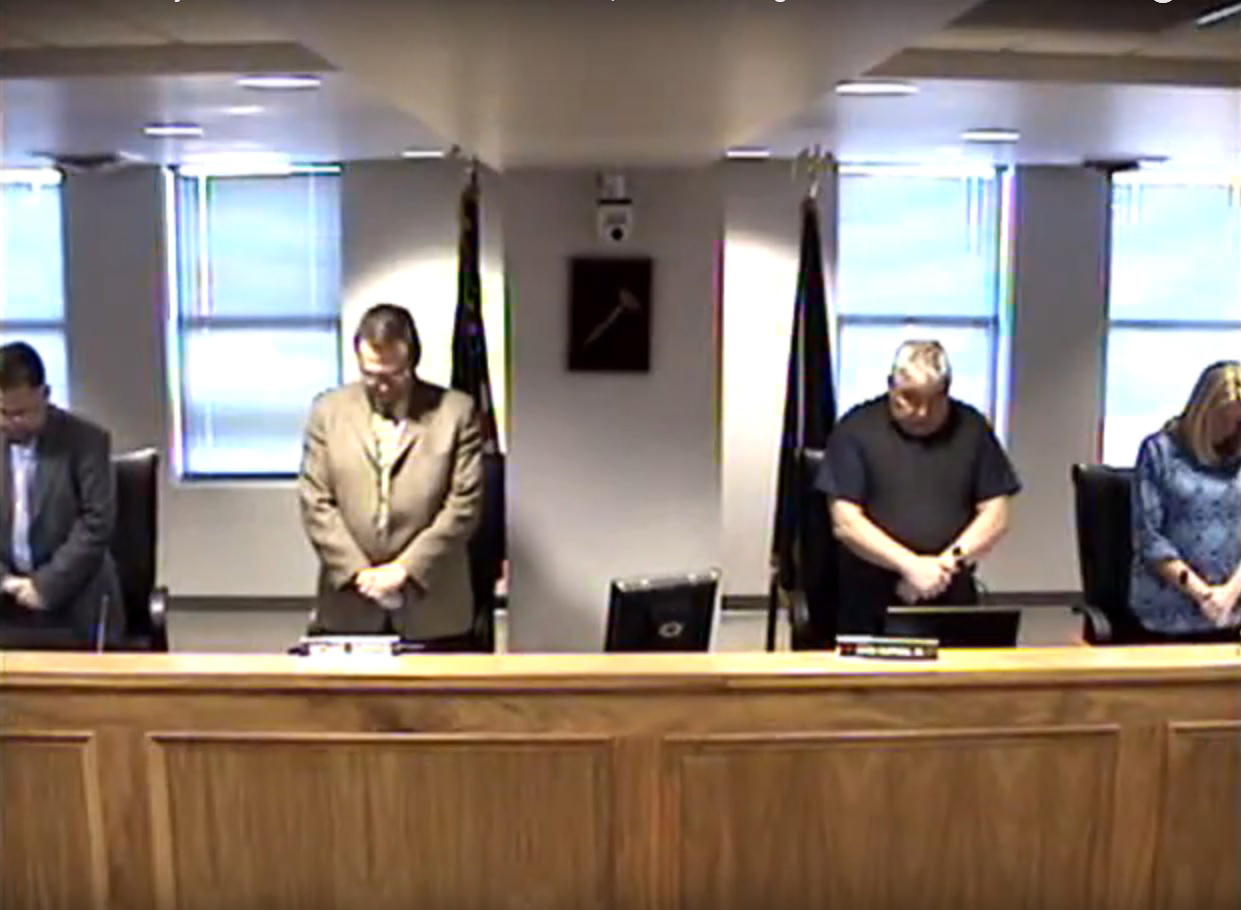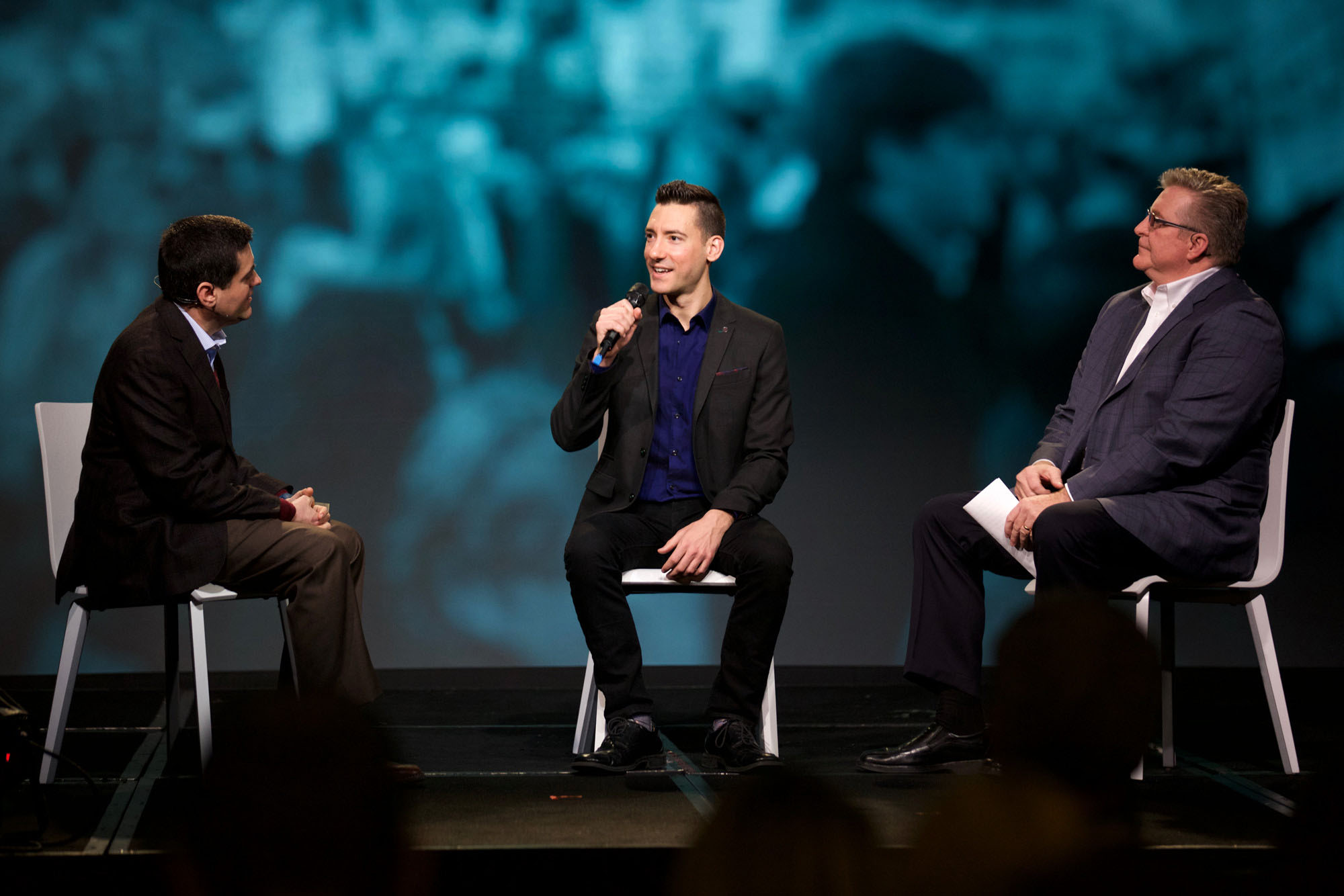
ERLC and Evangelicals for Life
by Russell Moore

ERLC President Russell Moore prays to close the Evangelicals for Life event January 22, 2015, in Washington, DC. Joining him in prayer are (from left) Kelly Rosati of Focus on the Family, Samuel Rodriguez of the National Hispanic Christian Leadership Conference, and Phillip Bethancourt of the ERLC. Photo by Chad Bartlett.
It may be surprising to realize that many of the people who are most vulnerable to the abortionist’s rhetoric when they are faced with an unwanted pregnancy are not actually pro-choice. They’re just scared, scared to scandalize their family or a church with their secret. The false gospel of the abortion clinic, which says, “We can make all your trouble go away for you,” is overwhelmingly seductive to them.
What they need more than a lesson in embryonic development is to have the Gospel preached to their conscience. This means much more than simply offering “The Roman’s Road” plan of salvation or prompting a sinner’s prayer. It means speaking directly with the message of Jesus’s complete sovereignty of the universe (including their lives) as well as His righteous indignation on the murder of the unborn. But, most importantly, they need to understand and embrace His complete absorption of God’s wrath on the cross, His invitation to mercy and fellowship, and the imputed righteousness of the Son of God.
The Gospel disarms the appeal of the abortion clinic because it offers truth with love, judgment with mercy, and righteousness with grace. The consciences of those around us don’t believe what they’re telling themselves. They’re scared and confused. Shine a light on their conscience, and then present the Gospel of reconciliation.
It’s important to understand that this is where the cultural battle for human dignity begins. It doesn’t begin on Capitol Hill or on CNN. It begins in your family, in your local church, and in your neighborhood.
The pro-life movement has set an example worthy of our imitation when it comes to practical, holistic mercy ministry. For more than forty years since Roe v. Wade, those committed to defending unborn life have done much more than preach and teach; they have welcomed the scared, the vulnerable, and the wounded and loved them. This has led to the establishment of crisis pregnancy centers in cities and small towns across the country. It has spawned adoption advocacy and built a culture of adoption in local churches. It’s true that our pro-life witness has a long way to go, but we do not, thankfully, conform to the caricature that says we believe life “begins at conception and ends at birth.”
Many Christians are utterly convinced in their heart of the personhood and dignity of the unborn, yet don’t know how to faithfully effectively advocate for life.
This is why I am excited to be a part of the Evangelicals For Life Conference in January. This conference exists to help evangelicals articulate a truly Christian doctrine on the dignity of all human life. Being pro-life, after all, means much more than being against abortion on demand; it means believing in the dignity of the elderly and infirm, and advocating for compassion and inclusion of the poor, the orphan, and the widow. No doctrine of human dignity that fails to speak to these cases is fully “pro-life.”
Sometimes Christians are encouraged to leave issues like this behind. Sometimes the fight for human dignity is portrayed as “culture war” baggage. For those of us that watched an executive from Planned Parenthood talk about the most valuable anatomy of dead children, we know this to be false. The stakes for human life and human dignity could not be higher, and the plight of those ignored by the world does not go unnoticed by our heavenly Father.
We have a Gospel word to speak to the abortionist and the unborn, to the orphan and those not considering adoption. Will you join me in Washington, on the anniversary of Roe v. Wade, January 21–22, as we seek to speak this word?
A Christian’s Response to the Planned Parenthood Videos
by Samuel James

Pro-life leader Lila Rose (left), who has made headlines for her undercover videos of Planned Parenthood abortion clinics, speaks in front of a Washington, DC, Planned Parenthood clinic while calling for Congress to defund the organization. Photo by Tom Strode.
For months, we watched as the Center for Medical Progress released video after video depicting grisly scenes of what seem to be clear-cut instances of human piracy within Planned Parenthood clinics. And though media coverage and political fervor have abated, the video evidence is not silent. But sadly, it seems the nation’s largest abortion provider is, for the moment, insulated from any serious censure. There are just too many political allies, too many finely-tuned talking points, and too few in positions of meaningful leadership willing to risk political fall-out to confront Planned Parenthood CEO Cecile Richards and her company.
So where does that leave us? What are we to think and say and do going forward? If what we saw in those videos was indeed what I believe we saw, we cannot be satisfied. We cannot shrug and go on to the “next cause.” If the videos were a moment of reality pro-choice Americans are unwilling to acknowledge, they were even more a moment of accountability for pro-life Americans. Something has changed, and a moral demand is placed upon those with the truth to do something faithful with it.
The first thing we must do as pro-life Christians is repent. We must repent of ever being comfortable with abortion as a “private values” issue. Abortion is not ultimately about “values” or “legislating morality.” It’s about justice for the unborn and fundamental human rights. It’s often easy to ignore what we don’t see happening in the downtown abortion clinic. But, no more. We have seen, and we have heard.
Secondly, we must prepare. We have no reason to think the legal battle to restore human rights to the unborn will be any easier than was the legal battle to restore human rights to millions of slaves in the nineteenth century. “Reproductive freedom” is the plantation of our time. It is a glossy, extravagant, externally beautiful phrase that runs on the churned-up bodies of the innocent. If attacking the materialism of the antebellum era—indeed, the materialism in many of our own hearts!—was difficult and costly back then, why should we think the moral struggle would be different now?
Not every legal skirmish over unborn rights will end in victory. Not every victory will be the complete victory we would want. Like British lawmaker William Wilberforce, who relentlessly worked to abolish slave trade in the United Kingdom in the early nineteenth century, we have to be sober and resolute enough to keep shouting, keep debating, and keep pressing even in the face of overwhelming odds and continuing political defeats.
Finally, we must preach the Gospel. Unless we preach the full Gospel of atonement, mercy, and justice we will not capture the hearts of this country.
The unborn are made in the image of the same God who put the sins of the world on His only Son. The Gospel is good news that the unborn, the elderly, and the disabled have inherent human dignity. Yes, every crime against that dignity can be absorbed by the sacrifice of the most dignified Being in the history of the cosmos. His Spirit in us is the driving force that will not allow us to be silent.
Planned Parenthood is open today, and for that we mourn. But we cannot resign ourselves to its world. We have too great a message, and too great a hope, not to endure in this epic struggle. Lives, and souls, depend on it.




















